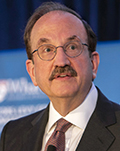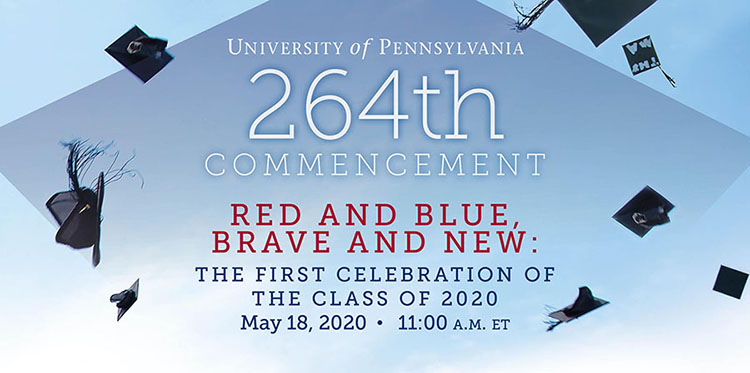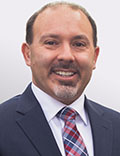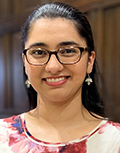Wharton School’s New Quantitative Finance Major, Professorship and Scholarship Program with $8 Million Gift from Bruce I. Jacobs
 Wharton Dean Geoff Garrett is delighted to announce a new chapter in finance research and education at the Wharton School. The MBA program is launching a new quantitative finance major within the finance department. New courses will be offered, bolstered by the establishment of the Dr. Bruce I. Jacobs Professorship in Quantitative Finance and the new Dr. Bruce I. Jacobs Scholars in Quantitative Finance. The Jacobs Scholars funding will provide top caliber students with the opportunity to compete for a second year financial academic award. The new professorship and scholars funds have been made possible by an $8 million gift from Bruce I. Jacobs (G’79, GRW’86). Together, they will usher in a new era of opportunities for students and faculty at Wharton.
Wharton Dean Geoff Garrett is delighted to announce a new chapter in finance research and education at the Wharton School. The MBA program is launching a new quantitative finance major within the finance department. New courses will be offered, bolstered by the establishment of the Dr. Bruce I. Jacobs Professorship in Quantitative Finance and the new Dr. Bruce I. Jacobs Scholars in Quantitative Finance. The Jacobs Scholars funding will provide top caliber students with the opportunity to compete for a second year financial academic award. The new professorship and scholars funds have been made possible by an $8 million gift from Bruce I. Jacobs (G’79, GRW’86). Together, they will usher in a new era of opportunities for students and faculty at Wharton.
The Dr. Bruce I. Jacobs Professorship in Quantitative Finance will support the appointment to Wharton’s finance department of faculty who are experts in quantitative finance. The Dr. Bruce I. Jacobs Scholarship in Quantitative Finance is an academic award dedicated to exceptional students entering their second year of the Wharton MBA program and majoring in quantitative finance. Recipients will each receive a $25,000 award in support of their tuition. Together, these students will form an elite group of Jacobs Scholars focusing on applying financial economics to security pricing and asset management. In addition to this financial support, Jacobs Scholars will be invited to explore networking opportunities with industry leaders at the annual conference of Wharton’s Jacobs Levy Equity Management Center for Quantitative Financial Research.
“Bruce is a pioneer and innovator in connecting academic research with investment management, and we are honored that he is making this bold new step in his immense ongoing support of the School,” said Dean Garrett. “His new gift will attract and nurture talented students and faculty in quantitative finance to prepare a new generation of leaders in finance for the challenges we face today and in the future. This, coupled with our new quantitative finance major, marks an exciting addition to Wharton’s stellar portfolio of finance offerings and opportunities for the incredible students and faculty in this community.”
The Jacobs Scholars funding will enable Wharton to attract top caliber MBA students, just as the professorship will fuel the recruitment and retention of stellar faculty in quantitative finance. The endowment will also provide targeted support for the new MBA major in quantitative finance, build on the momentum of quantitative finance programming at the School, and prepare leaders in quantitative finance for success and impact in communities across the world.
The new MBA major in quantitative finance will include cross-disciplinary content from accounting; statistics; and operations, information and decisions. The major will appeal to students with strong quantitative backgrounds in a variety of subjects, such as engineers and computer science majors, who aspire to develop their skills for quantitative applications in finance. Students in the major will hone their technical expertise and leadership skills.
The funds extend Dr. Jacobs’ longstanding generosity to the Wharton School. Together with Kenneth N. Levy (WG’76, G’82) he established and chairs the Jacobs Levy Equity Management Center for Quantitative Financial Research, the Jacobs Levy Equity Management Dissertation Fellowships in Quantitative Finance, and the Wharton-Jacobs Levy Prize for Quantitative Financial Innovation.
“My aspiration in giving to Wharton is to build a community of people interested and invested in quantitative finance and to spark a ripple effect on a global scale,” said Dr. Jacobs. “Great progress has been achieved by the Jacobs Levy Center, Fellowship, and Prize at Wharton. Those successes and Wharton’s commitment to the future of finance inspired me to deepen my support of students and the faculty who will enrich future generations of leaders and the broader economy. I can think of no better time for this initiative as we face new economic, health, and markets issues that will shape the world economy for decades.”
Dr. Jacobs is co-chief investment officer, portfolio manager and co-director of research at Jacobs Levy Equity Management, which he co-founded in 1986. He is author of Too Smart for Our Own Good: Ingenious Investment Strategies, Illusions of Safety, and Market Crashes and Capital Ideas and Market Realities: Option Replication, Investor Behavior, and Stock Market Crashes. He has also written numerous articles on equity management that have appeared in a host of academic journals and co-authored with Ken Levy, Equity Management: Quantitative Analysis for Stock Selection and Equity Management: The Art and Science of Modern Quantitative Investing, 2nd ed.
Dr. Jacobs holds an MA in applied economics and a PhD in finance from Wharton.
He is chair of the Advisory Board of the Jacobs Levy Equity Management Center for Quantitative Financial Research and a prior Wharton finance faculty member.
Penn's 264th Commencement: Until We Meet Again!
 In-person ceremonies marking Penn’s 264th commencement have not gone away. They are merely postponed, waiting for a day when we can all once again safely gather together.
In-person ceremonies marking Penn’s 264th commencement have not gone away. They are merely postponed, waiting for a day when we can all once again safely gather together.
This is a class that has put the health of society and the safety of others first. And so, in a very real way, you will always be first in my heart.
In recognition of your hard work, your many achievements—and in anticipation of our gathering yet to come that will truly be like none Penn has seen before—I invite you to join with me, the deans, your professors, classmates, families and friends for a fast, fun, online celebration of your myriad impressive academic achievements.
Please plan to join us on Monday, May 18 at 11 a.m. for the University-wide celebration.
For information and links to your individual School ceremony, as well as information regarding the various online celebrations, optional regalia orders and when students will receive their diplomas, visit Penn’s commencement site: commencement.upenn.edu, or Penn’s social media channels, to tune in.
In solidarity, in anticipation, and in the highest regard for all you have achieved,
—Amy Gutmann, President
SEAS 2020 Teaching Awards
The recipients of the annual Penn Engineering teaching and advising awards are selected directly by Penn Engineering students after thoughtful consideration. The School of Engineering and Applied Science is filled with gifted educators who inspire students with their dedication and excellence.
The S. Reid Warren, Jr., Award
 Liang Feng, assistant professor in materials science and engineering and electrical and systems engineering, has been awarded the S. Reid Warren, Jr., Award, which is presented annually by the undergraduate student body and the Engineering Alumni Society in recognition of outstanding service in stimulating and guiding the intellectual and professional development of undergraduate students.
Liang Feng, assistant professor in materials science and engineering and electrical and systems engineering, has been awarded the S. Reid Warren, Jr., Award, which is presented annually by the undergraduate student body and the Engineering Alumni Society in recognition of outstanding service in stimulating and guiding the intellectual and professional development of undergraduate students.
One student remarked, “Dr. Feng is one of the most caring professors I’ve ever had and truly cares for the success of each and every one of his students. In taking his course last semester, I got a sense of the passion he has for inspiring the next generations of engineers.”
Dr. Feng received a BS and an MS in physics from Nanjing University in China. He subsequently earned a PhD in electrical engineering from the University of California San Diego.
Ford Motor Company Award for Faculty Advising
 Paris Perdikaris, assistant professor in mechanical engineering and applied mechanics, has been awarded the Ford Motor Company Award for Faculty Advising. This award recognizes dedication to helping students realize their educational, career and personal goals.
Paris Perdikaris, assistant professor in mechanical engineering and applied mechanics, has been awarded the Ford Motor Company Award for Faculty Advising. This award recognizes dedication to helping students realize their educational, career and personal goals.
One student remarked, “Dr. Perdikaris is a quintessential mentor as he allowed me to pursue a co-advised independent study with him and Professor Talid Sinno in chemical and biomolecular engineering. Given my interdisciplinary interests, Dr. Perdikaris has been an exceptional mentor for me for both my research and personal goals.”
Dr. Perdikaris received a diploma in naval architecture and marine engineering from the National Technical University of Athens in 2009. He went on to earn MSc and PhD degrees in applied mathematics from Brown University in 2010 and 2015, respectively.
Hatfield Award for Excellence in Teaching in the Lecturer and Practice Professor Track
 Tania Khanna, senior lecturer in electrical and systems engineering, has been awarded the Hatfield Award for Excellence in Teaching in the Lecturer and Practice Professor Track. This award recognizes outstanding teaching ability, dedication to innovative undergraduate instruction, and exemplary service to the School in consistently inspiring students in the engineering and scientific profession.
Tania Khanna, senior lecturer in electrical and systems engineering, has been awarded the Hatfield Award for Excellence in Teaching in the Lecturer and Practice Professor Track. This award recognizes outstanding teaching ability, dedication to innovative undergraduate instruction, and exemplary service to the School in consistently inspiring students in the engineering and scientific profession.
Describing Dr. Khanna, a student remarked, “I have seen her take a personal interest in making sure every single one of her students builds a strong sense of intuition for the topics at hand, and it pays off. If it wasn’t for Dr. Khanna’s help, I’m not sure if I would still be interested in pursuing a career in electrical engineering.”
Dr. Khanna received a BS in electrical and computer engineering from Cornell University in 2005. She later earned SM and PhD degrees in electrical engineering and computer science from the Massachusetts Institute of Technology.
Digital Penn Relays: April 24
On April 24, the iconic Penn Relays go online. The digital event will feature a Minecraft competition, virtual tables and a workout class. Gen.G, the Global eSports organization connecting the best gamers in the United States and Asia, and the Penn Relays are partnering to produce an all-new Digital Penn Relays, presented by the United States Marine Corps. The Digital Penn Relays will be the first-ever digital livestream with gaming-related content designed to connect the community with competition and infotainment. The event will take place on Friday, April 24, from noon to 5 p.m. at twitch.tv/thepennrelays This would have been day two of the previously scheduled three-day 2020 Penn Relays presented by Toyota that were postponed due to the COVID-19 pandemic.
A Message on Summer Programming and Budget Considerations for Fiscal Year 2021
April 13, 2020
The guiding priority of the University, from the outset of the COVID-19 pandemic, has been to protect the health and safety of Penn students, faculty, staff, postdocs, patients and visitors. Moving to a virtual learning platform and depopulating the campus in a matter of days required an unprecedented effort. We are profoundly grateful to everyone at Penn who contributed to facilitate this extraordinary transition. It was a heroic accomplishment, and it ensures that our core missions of teaching, learning, and research can continue despite the significant disruptions brought about by the pandemic. While many of us are working remotely, we wish to thank and acknowledge the dedicated staff—including custodial, dining, safety officers, animal care, and skilled trades—who continue to come to campus to serve our students, support our faculty and research, steward our buildings, and keep us and our Philadelphia neighbors safe.
Many of you have asked about the impact of the COVID-19 pandemic on the University’s finances. As the end of the semester approaches, we want to share with you the University’s plans for the summer and coming fiscal year, which begins on July 1.
Summer 2020 Activities and Programs
We are announcing today that all summer courses and in-person programs must be delivered remotely or online. There will be no summer programs offered in-person on campus, including summer camps and summer courses. This extends our previous guidance about the summer to include Summer Session II, which begins on July 2. For undergraduates, please check Penn InTouch for updated summer course information. For graduate and professional students, please consult your Schools and programs. For camps and other non-credit programs, please check with the program for specific guidance. Summer study abroad remains cancelled, along with all other University-related travel, as originally announced on March 13. There will be no changes to previously established costs and grading policies for credit-bearing undergraduate courses in the Summer Sessions.
Fiscal Year 2021 Budget
The unpredictability and duration of the pandemic requires us to exercise the utmost prudence and caution in the year ahead. We are initiating a number of significant measures to reduce expenses, with the goals of reducing ongoing costs, preserving jobs, and maintaining salary continuity. Many of our financial mitigation actions focus on compensation, which accounts for roughly 60% of our annual University-wide expenses.
- Hiring Freeze: There will be a university-wide hiring freeze on all positions, both new and replacement, except grant-funded positions approved by the highest level of the School/center.
- Limited Merit Increase Program: There will be a limited merit increase program in fiscal year 2021 focused on our employees with a base salary at or below $70,000. For those with salaries above this threshold, including officers, Deans and Vice Presidents, there will be no annual wage or stipend increases for the 2021 fiscal year.
- Temporary Positions, Acting Rates, Additional Pays and Overtime Restricted: No new temporary staff, interns, non-work study student workers, or co-op students are permitted to be hired. No new acting rates or additional pays are permitted without the approval of the Dean, Director, or Vice President and the approval of Human Resources. Overtime should be minimized to the fullest extent possible and carefully monitored.
- Mid-Year Salary Adjustments Eliminated: There will be no mid-year salary adjustments available in fiscal year 2021.
In addition, we are extending through fiscal year 2021 the implementation of non-compensation actions currently in place:
- Reducing Discretionary Spending: We urge Schools and Centers to immediately implement reductions in discretionary spending that are not critical to the operation of the University. All University-related travel was prohibited on March 13. Should travel guidance be revised at a future date, we expect travel and entertainment expenditures to be substantially reduced. Other non-essential current expenses should be reduced to the fullest extent possible, including outside services, consulting, conferences, and meetings.
- Pausing Capital Projects: Capital projects that are already in design or construction and have a fully defined funding plan can continue. However, Schools and centers are being directed to review their capital planning to evaluate whether they can still commit the same levels of funding as previously planned, especially when utilizing unrestricted funds. No new feasibility or design studies will be initiated at this time. Per Governor Wolf’s executive order, construction projects deemed not “life-sustaining” have been directed to shut down.
- Prioritize Use of Donor Restricted Funds: Schools and centers are being directed to ensure that they use operating gifts and spendable endowment income balances in advance of unrestricted funds, consistent with gift terms, to provide the greatest degree of flexibility in responding to the economic circumstances.
In implementing the steps outlined above, our goal is to preserve the vast majority of staff positions at Penn until we can return to full campus operations, recognizing that no institution, including Penn, can accurately forecast today the full impact of this crisis on our future budgets.
In response to these rapidly changing economic conditions and their impact on our staff and third-party contractors, we have created The Penn COVID-19 Emergency Grant Assistance Fund. This fund will distribute grants to full-time and part-time employees, as well as certain contracted employees in need of emergency financial assistance due to the economic downturn created by the COVID-19 crisis. Eligible applicants who earn at or below $70,000 can receive a tax-free grant up to $1,500 for full-time staff and $750 for part-time staff. Staff and contracted employees are asked to visit https://coronavirus.upenn.edu for information and instructions on how to apply for these funds. Acceptance of applications began at noon on Monday, April 13.
The economic downturn will not affect Penn’s long-standing commitment to grant-based financial aid, sustaining need-based financial aid for undergraduate students, competitive stipends for PhD students, and extensive grants and subsidy programs for graduate and professional students.
While the steps we have taken are difficult and additional financial measures may need to be considered in the future, we are confident that there are better days ahead, and Penn will emerge from this crisis strong. We are inspired by Penn researchers who are working overtime to develop and test a vaccine and ever grateful for the team at Penn Medicine who are passionately and professionally caring for those afflicted and nursing them to health. We will overcome these challenging times because of the talent, resilience, and determination of every member of the Penn community.
Thank you for your patience and support, and we will continue to keep you updated as the situation moves forward.
—Wendell Pritchett, Provost
—Craig Carnaroli, Executive Vice President
Russell DiLeo: University Comptroller
 We are excited to share the appointment of Russell DiLeo as University Comptroller, following a national search. The University Comptroller is the chief accounting officer for the University and is responsible for ensuring that the University’s financial policies, procedures, operations and practices are appropriate, effective and efficient in a decentralized environment. The position requires strong leadership, the ability to collaborate broadly, high integrity, a deep understanding of accounting standards and tax regulations, and the ability to represent the institution on many levels and on multiple project teams. The University Comptroller plays a critical role in establishing systems and best practices that support the University’s education and research mission while also ensuring compliance with local, state, federal and international regulations. Through his work with Penn over 19 years and through his leadership as interim comptroller, he has lived up to each of these demanding criteria.
We are excited to share the appointment of Russell DiLeo as University Comptroller, following a national search. The University Comptroller is the chief accounting officer for the University and is responsible for ensuring that the University’s financial policies, procedures, operations and practices are appropriate, effective and efficient in a decentralized environment. The position requires strong leadership, the ability to collaborate broadly, high integrity, a deep understanding of accounting standards and tax regulations, and the ability to represent the institution on many levels and on multiple project teams. The University Comptroller plays a critical role in establishing systems and best practices that support the University’s education and research mission while also ensuring compliance with local, state, federal and international regulations. Through his work with Penn over 19 years and through his leadership as interim comptroller, he has lived up to each of these demanding criteria.
Russell started at Penn in 2000 as general accountant and progressed through every level of the Comptroller’s Office, serving as associate comptroller, financial reporting and accounting operations, before he took on the interim Comptroller’s role after John Horn’s retirement (Almanac March 3, 2020). He has great credibility throughout his vast external network and has been recognized by his higher education peers and PwC, our external accounting firm, as having some of the strongest technical skills in the industry coupled with best-in-class execution skills. He is viewed as being on the front line of industry trends/accounting issues.
Russell is a strong collaborator across the University and is also known for his ability to develop excellent accounting professionals, many of whom are now in our Schools/Centers. He very much looks forward to deeper relationships across the University and the Health System. We wish to express our appreciation to the Hiring Committee comprised of senior financial executives from both the University and the Health System. His appointment will be brought to the Trustees for approval at its May meeting.
—Craig Carnaroli, Executive Vice President
—MaryFrances McCourt, Vice President of Finance and Treasurer
 Wharton Dean Geoff Garrett is delighted to announce a new chapter in finance research and education at the Wharton School. The MBA program is launching a new quantitative finance major within the finance department. New courses will be offered, bolstered by the establishment of the Dr. Bruce I. Jacobs Professorship in Quantitative Finance and the new Dr. Bruce I. Jacobs Scholars in Quantitative Finance. The Jacobs Scholars funding will provide top caliber students with the opportunity to compete for a second year financial academic award. The new professorship and scholars funds have been made possible by an $8 million gift from Bruce I. Jacobs (G’79, GRW’86). Together, they will usher in a new era of opportunities for students and faculty at Wharton.
Wharton Dean Geoff Garrett is delighted to announce a new chapter in finance research and education at the Wharton School. The MBA program is launching a new quantitative finance major within the finance department. New courses will be offered, bolstered by the establishment of the Dr. Bruce I. Jacobs Professorship in Quantitative Finance and the new Dr. Bruce I. Jacobs Scholars in Quantitative Finance. The Jacobs Scholars funding will provide top caliber students with the opportunity to compete for a second year financial academic award. The new professorship and scholars funds have been made possible by an $8 million gift from Bruce I. Jacobs (G’79, GRW’86). Together, they will usher in a new era of opportunities for students and faculty at Wharton.
 In-person ceremonies marking Penn’s 264th commencement have not gone away. They are merely postponed, waiting for a day when we can all once again safely gather together.
In-person ceremonies marking Penn’s 264th commencement have not gone away. They are merely postponed, waiting for a day when we can all once again safely gather together.  Liang Feng, assistant professor in materials science and engineering and electrical and systems engineering, has been awarded the S. Reid Warren, Jr., Award, which is presented annually by the undergraduate student body and the Engineering Alumni Society in recognition of outstanding service in stimulating and guiding the intellectual and professional development of undergraduate students.
Liang Feng, assistant professor in materials science and engineering and electrical and systems engineering, has been awarded the S. Reid Warren, Jr., Award, which is presented annually by the undergraduate student body and the Engineering Alumni Society in recognition of outstanding service in stimulating and guiding the intellectual and professional development of undergraduate students. Paris Perdikaris, assistant professor in mechanical engineering and applied mechanics, has been awarded the Ford Motor Company Award for Faculty Advising. This award recognizes dedication to helping students realize their educational, career and personal goals.
Paris Perdikaris, assistant professor in mechanical engineering and applied mechanics, has been awarded the Ford Motor Company Award for Faculty Advising. This award recognizes dedication to helping students realize their educational, career and personal goals. Tania Khanna, senior lecturer in electrical and systems engineering, has been awarded the Hatfield Award for Excellence in Teaching in the Lecturer and Practice Professor Track. This award recognizes outstanding teaching ability, dedication to innovative undergraduate instruction, and exemplary service to the School in consistently inspiring students in the engineering and scientific profession.
Tania Khanna, senior lecturer in electrical and systems engineering, has been awarded the Hatfield Award for Excellence in Teaching in the Lecturer and Practice Professor Track. This award recognizes outstanding teaching ability, dedication to innovative undergraduate instruction, and exemplary service to the School in consistently inspiring students in the engineering and scientific profession. We are excited to share the appointment of Russell DiLeo as University Comptroller, following a national search. The University Comptroller is the chief accounting officer for the University and is responsible for ensuring that the University’s financial policies, procedures, operations and practices are appropriate, effective and efficient in a decentralized environment. The position requires strong leadership, the ability to collaborate broadly, high integrity, a deep understanding of accounting standards and tax regulations, and the ability to represent the institution on many levels and on multiple project teams. The University Comptroller plays a critical role in establishing systems and best practices that support the University’s education and research mission while also ensuring compliance with local, state, federal and international regulations. Through his work with Penn over 19 years and through his leadership as interim comptroller, he has lived up to each of these demanding criteria.
We are excited to share the appointment of Russell DiLeo as University Comptroller, following a national search. The University Comptroller is the chief accounting officer for the University and is responsible for ensuring that the University’s financial policies, procedures, operations and practices are appropriate, effective and efficient in a decentralized environment. The position requires strong leadership, the ability to collaborate broadly, high integrity, a deep understanding of accounting standards and tax regulations, and the ability to represent the institution on many levels and on multiple project teams. The University Comptroller plays a critical role in establishing systems and best practices that support the University’s education and research mission while also ensuring compliance with local, state, federal and international regulations. Through his work with Penn over 19 years and through his leadership as interim comptroller, he has lived up to each of these demanding criteria..jpg) Roselyn (Roz) Eisenberg, professor emerita of pathobiology at the University of Pennsylvania’s School of Veterinary Medicine, died on March 14 after a fall and short illness. She was 79.
Roselyn (Roz) Eisenberg, professor emerita of pathobiology at the University of Pennsylvania’s School of Veterinary Medicine, died on March 14 after a fall and short illness. She was 79. Penn Nursing’s Peggy Compton, the van Ameringen Chair in Psychiatric and Mental Health Nursing and associate professor in the department of family and community health, was selected for induction to the International Nurse Research Hall of Fame. She will be honored by Sigma Theta Tau International (STTI) during the 31st International Nursing Research Congress, July 23-27, now being held virtually.
Penn Nursing’s Peggy Compton, the van Ameringen Chair in Psychiatric and Mental Health Nursing and associate professor in the department of family and community health, was selected for induction to the International Nurse Research Hall of Fame. She will be honored by Sigma Theta Tau International (STTI) during the 31st International Nursing Research Congress, July 23-27, now being held virtually. Nwamaka D. Eneanya, nephrologist and assistant professor of medicine and epidemiology at PSOM, has been named one of the 40 Under 40 Leaders in Minority Health by the National Minority Quality Forum (NMQF). The award recognizes the next generation of thought leaders in reducing health disparities to build sustainable communities. Dr. Eneanya is the first female Black nephrologist on Penn’s faculty.
Nwamaka D. Eneanya, nephrologist and assistant professor of medicine and epidemiology at PSOM, has been named one of the 40 Under 40 Leaders in Minority Health by the National Minority Quality Forum (NMQF). The award recognizes the next generation of thought leaders in reducing health disparities to build sustainable communities. Dr. Eneanya is the first female Black nephrologist on Penn’s faculty. Regina Fairbanks is a biology major in the School of Arts and Sciences. She has been working in the Levine Lab, where she studies reproductive arrest in fruit flies. As a Penn Museum Fellow, Ms. Fairbanks has been working in the Center for the Analysis of Archaeological Materials analyzing botanical remains from an archaeological site in Israel to understand agricultural practices in the Early Bronze Age. She previously was a National Science Foundation research intern at the Smithsonian National Museum of Natural History in the botany department. She is also a Benjamin Franklin Scholar. Ms. Fairbanks intends to pursue a PhD in biology, conduct research using molecular approaches at a natural history museum and curate a museum collection.
Regina Fairbanks is a biology major in the School of Arts and Sciences. She has been working in the Levine Lab, where she studies reproductive arrest in fruit flies. As a Penn Museum Fellow, Ms. Fairbanks has been working in the Center for the Analysis of Archaeological Materials analyzing botanical remains from an archaeological site in Israel to understand agricultural practices in the Early Bronze Age. She previously was a National Science Foundation research intern at the Smithsonian National Museum of Natural History in the botany department. She is also a Benjamin Franklin Scholar. Ms. Fairbanks intends to pursue a PhD in biology, conduct research using molecular approaches at a natural history museum and curate a museum collection. Samuel Goldstein is pursuing a bachelor’s degree in physics and mathematics and a master’s degree in physics in the School of Arts and Sciences. He has research experience with the US Department of Energy’s Brookhaven National Laboratory’s Cosmology Group and Penn’s High Energy Physics Group. Mr. Goldstein is currently researching non-linear galaxy bias in preparation for the Large Synoptic Survey Telescope. He is also a CURF Research Peer Advisor and a tutor. He intends to pursue a PhD in physics and then teach at a university and conduct research in cosmology.
Samuel Goldstein is pursuing a bachelor’s degree in physics and mathematics and a master’s degree in physics in the School of Arts and Sciences. He has research experience with the US Department of Energy’s Brookhaven National Laboratory’s Cosmology Group and Penn’s High Energy Physics Group. Mr. Goldstein is currently researching non-linear galaxy bias in preparation for the Large Synoptic Survey Telescope. He is also a CURF Research Peer Advisor and a tutor. He intends to pursue a PhD in physics and then teach at a university and conduct research in cosmology. Adam Konkol is pursuing a bachelor’s degree in biochemistry, biophysics and physics and a master’s degree in physics in the School of Arts and Sciences. He has worked with biology professor Doris Wagner on factors involved in plant genetic regulation and assistant professor Eleni Katifori on complex adaptive networks in biology. A recipient of the Vagelos Challenge Award, Mr. Konkol’s current work focuses on vascular development on the surface of the brain as well as the study of tidal river deltas. Mr. Konkol has also led physics labs and weekend organic chemistry workshops. He is training to become a speaking coach with Communication Within the Curriculum at Penn and aims to create physics-based community outreach programs. He intends to pursue a PhD in physics.
Adam Konkol is pursuing a bachelor’s degree in biochemistry, biophysics and physics and a master’s degree in physics in the School of Arts and Sciences. He has worked with biology professor Doris Wagner on factors involved in plant genetic regulation and assistant professor Eleni Katifori on complex adaptive networks in biology. A recipient of the Vagelos Challenge Award, Mr. Konkol’s current work focuses on vascular development on the surface of the brain as well as the study of tidal river deltas. Mr. Konkol has also led physics labs and weekend organic chemistry workshops. He is training to become a speaking coach with Communication Within the Curriculum at Penn and aims to create physics-based community outreach programs. He intends to pursue a PhD in physics. Shreya Parchure is a bioengineering major in the School of Engineering and Applied Science. She has been working with Roy Hamilton, who directs the Laboratory for Cognition and Neural Stimulation in the Perelman School of Medicine, characterizing a form of non-invasive brain stimulation for use in neurorehabilitation after stroke. The work with Dr. Hamilton is through a Faculty Mentoring Undergraduate Research grant. She also is creating a cardiac surgical device with support from Penn Health-Tech. She is a Rachleff Scholar and a recipient of a Vagelos Undergraduate Research Grant. As a United Nations Millennium Fellow, Ms. Parchure led a social-impact initiative expanding her work with Penn’s Intercultural Leadership Program. She serves as a CURF Research Peer Advisor and as co-editor-in-chief of the Penn Bioethics Journal. She intends to pursue an MD/PhD in neuroengineering and conduct medical research.
Shreya Parchure is a bioengineering major in the School of Engineering and Applied Science. She has been working with Roy Hamilton, who directs the Laboratory for Cognition and Neural Stimulation in the Perelman School of Medicine, characterizing a form of non-invasive brain stimulation for use in neurorehabilitation after stroke. The work with Dr. Hamilton is through a Faculty Mentoring Undergraduate Research grant. She also is creating a cardiac surgical device with support from Penn Health-Tech. She is a Rachleff Scholar and a recipient of a Vagelos Undergraduate Research Grant. As a United Nations Millennium Fellow, Ms. Parchure led a social-impact initiative expanding her work with Penn’s Intercultural Leadership Program. She serves as a CURF Research Peer Advisor and as co-editor-in-chief of the Penn Bioethics Journal. She intends to pursue an MD/PhD in neuroengineering and conduct medical research.

